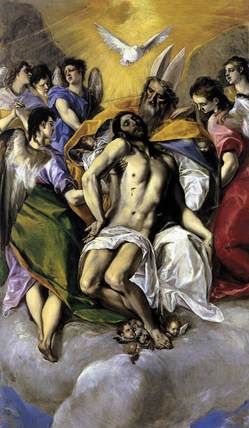The Church professes her faith in the one God, who is at the
same time the Most Holy and ineffable Trinity of Persons: Father, Son and Holy
Spirit. The Church lives by this truth contained in the most ancient symbols of
faith. Paul VI recalled it in our times on the occasion of the 1900th
anniversary of the martyrdom of the holy Apostles Peter and Paul (1968), in the
symbol he presented which is universally known as the Credo of the People of
God.
Only “he who has wished to make himself known to us, and who
‘dwelling in light inaccessible’ (1 Timothy 6:16) is in himself above every
name, above every thing and above every created intellect…can give us right
and full knowledge of this reality by revealing himself as Father, Son and Holy
Spirit, in whose eternal life we are by grace called to share, here below in
the obscurity of faith and after death in eternal light.”
God is incomprehensible to us. He wished to reveal himself, not only as the one creator and Almighty Father, but also as Father, Son, and Holy Spirit. This revelation reveals in its essential source the truth about God, who is love: God is live in the interior life itself of the one divinity. This live is revealed as an ineffable communion of persons. This “mystery the most profound, the mystery of the intimate life of God himself” has been revealed to us by Jesus Christ: “He who is in the bosom of the Father, he has made him known” (John 1:18). The last words with which Christ concluded his earthly mission after the resurrection were addressed to the apostles, according to St. Matthew’s Gospel: “Go therefore and make disciples of all nations. Baptize them in the name of the Father and of the Son and of the Holy Spirit” (Matthew 28:119). These words began the Church’s mission and indicated her fundamental and constitutive task. The Church’s first task is to teach and baptize, to baptize means “to immerse” (therefore one baptizes with water) so that all may come to share God’s trinitarian life.
(Pope John Paul II, General Audience, October 9, 1985)
